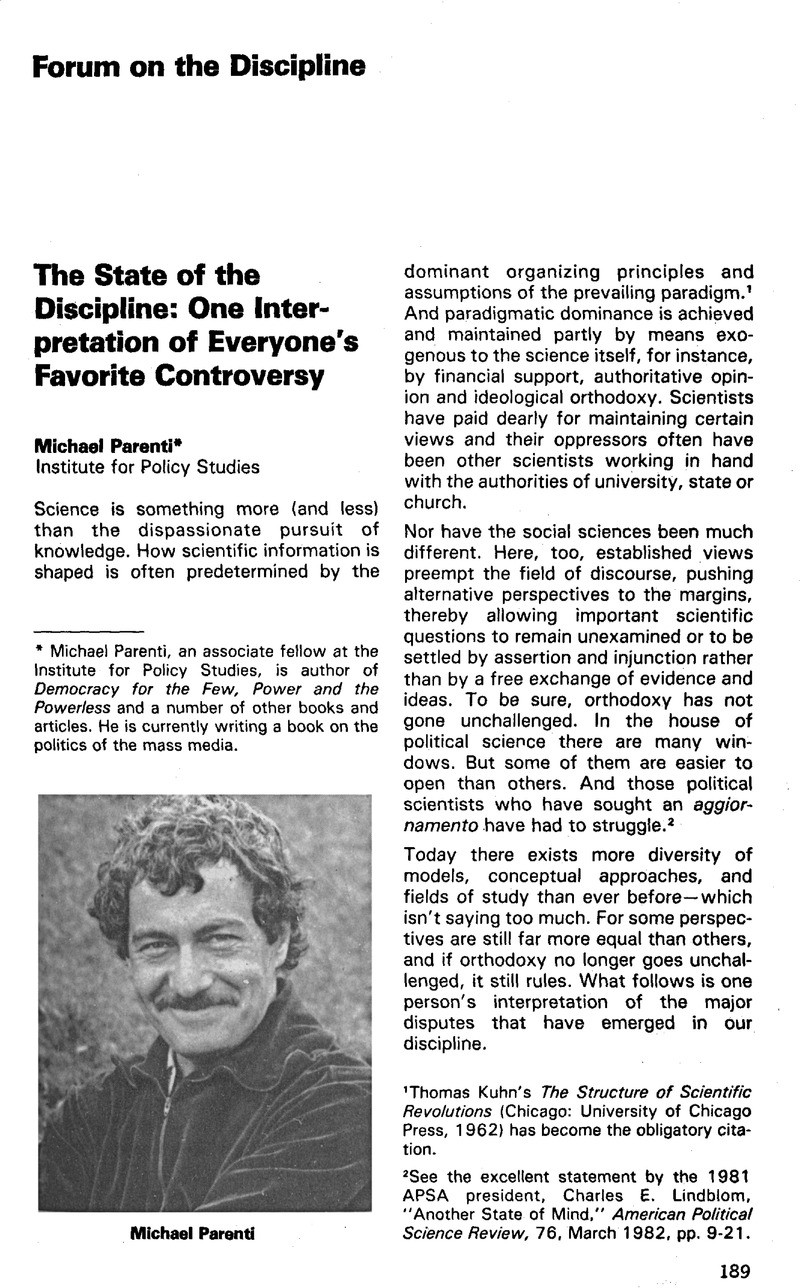Article contents
The State of the Discipline: One Interpretation of Everyone's Favorite Controversy
Published online by Cambridge University Press: 25 November 2022
Abstract

- Type
- Other
- Information
- Copyright
- Copyright © The American Political Science Association 1983
References
1 Kuhn's, Thomas The Structure of Scientific Revolutions (Chicago: University of Chicago Press, 1962)Google Scholar has become the obligatory citation.
2 See the excellent statement by the 1981 APSA president, Lindblom, Charles E., “Another State of Mind,” American Political Science Review, 76, March 1982, pp. 9–21.CrossRefGoogle Scholar
3 Keep in mind that terms like “institutionalist,” “behavioralist,” “centrist,” “radical,” etc. are themselves less than precise designations of complex variations and shadings. There are differences of opinion about who might be labeled what.
4 LaPalombara, Joseph, “Assessing the Political Environment for Business: A New Role for Political Scientists?” PS, 15, Spring 1982, pp. 180–186.CrossRefGoogle Scholar Similarly, in the January 1983 APSA Personnel Service Newletter the CIA advertizes for “Analysts to work in the areas of political change in the Third World…. They should have an interest in social change, revolutionary organizations and regime responsiveness and capabilities.”
5 Studies of public policy outputs and ways of analyzing them did begin to appear in the 1970s.
6 Readers may recall the verbal attacks at the 1968 and 1969 Association meetings. See also the letters directed against the Caucus in PS during this same period, and my communication in PS (Fall, 1969) in response to comments by Anthony King, Robert Dahl and Karl Deutsch.
7 For case studies that question the centrist pluralist assumptions see Domhoff, G. William, Who Really Rules? (New Brunswick, N.J.: Transaction Books, 1978)Google Scholar; Crenson, Matthew, The Unpolitics of Air Pollution (Baltimore: Johns Hopkins University Press, 1970)Google Scholar; Parenti, Micahel, “Power and Pluralism: A View From the Bottom,” Journal of Politics, 32, August 1970, pp. 501–530.CrossRefGoogle Scholar
8 For a discussion of how the study of the power of money fell between the two chairs of political science and economics see Bretton, Henry, The Power of Money (Albany, N.Y.: SUNY Press, 1980).Google Scholar
9 See the discussion in Lindblom, op. cit. Not all centrists hold to all the above positions. I am talking about major tendencies.
10 PS, Summer 1981, p. 597. The speech was in acceptance of the 1981 National Capital Area Political Science Association Pi Sigma Alpha Award to a political scientist who has made a significant contribution “to strengthening the relationship between political science and public service.”
11 Increasingly the purges are being conducted not by departmental peers but by administrators. Sometimes politicians and right-wing media play a crucial role as in the Berteli Oilman case and several others. In the 1950s faculties were purged by witch-hunting congressional, state and university committees. See the excellent work done on this by Ellen W. Schrecker, especially her “An Obligation of Candor: The Academy's Response to Congressional Investigating Committees” paper at the American Historical Association meeting, December 1982. Having judged leftist scholars as incapable of disinterested or “real” scholarship, the centrists can refuse to hire them under the guise of protecting rather than violating academic standards. Such was the argument used to deny Samuel Bowles tenure at Harvard where some contended that Marxist economics is not really scholarly nor is it economics.
- 4
- Cited by




